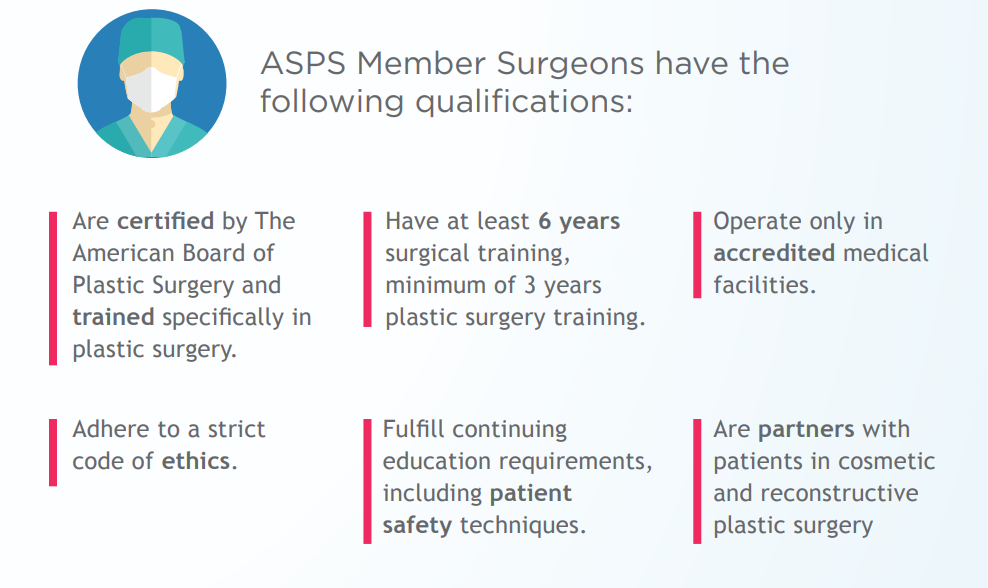 ‘Cosmetic Surgery’ is not just another way of saying ‘Plastic Surgery’
‘Cosmetic Surgery’ is not just another way of saying ‘Plastic Surgery’
Did you know?
‘Cosmetic Surgery’ is not just another way of saying ‘Plastic Surgery,’ and the two types of surgeons are not used interchangeably. Doctors who promote themselves as certified by the American Board of Cosmetic Surgery (ABCS) do NOT measure up or meet the criteria required for Board-Certified Plastic Surgeons. ABCS-certified physicians include Internists and Dermatologists that market themselves as board-certified cosmetic surgeons – most of which perform complex aesthetic procedures outside the scope of their primary residence training.
What does that mean?
The ABCS offers a certification process for non-plastic surgeon physicians desiring third-party credentials in aesthetic surgery – whereas physicians accredited by the American Board of Plastic Surgery (ABPS) have ample training experience and qualifications.
The American Society of Plastic Surgeons is the largest organization of Board-Certified Plastic Surgeons in the world. A study published in the official medical journal of the ASPS, Plastic and Reconstructive Surgery, assessed the residency training history and advertised scope of practices for 342 ABCS-certified physicians. Their findings were disturbing.
- 212 of the ABCS members held American Board of Medical Specialties board certifications (60.2%)
- Over half (62.6%) of ABCS diplomates performed surgical operations beyond the scope of their American Council for Graduate Medical Education or Commission on Dental Accreditation training.
- Specialties with the highest prevalence of practicing beyond scope of training were General Surgery (69), Otolaryngology (65), Oral and Maxillofacial Surgery (30), Obstetrics and Gynecology (17), Dermatology (15), and Internal Medicine (2).
- The most commonly offered out-of-scope procedures were liposuction (59.6%), abdominoplasty (50.0%), breast augmentation (49/7%), buttock augmentation (36.5%), labiaplasty (13.5%), and rhinoplasty (11.1%).
In 2019, Board-Certified Plastic Surgeons performed 18.1 million cosmetic procedures, a 160% increase from the previous decade. With the increased demand for cosmetic surgery, more and more providers– such as Physician Assistants, Gynecologists, Dermatologists, Internists, etc. – have been attracted to the aesthetic marketplace.
Unfortunately, there has been substantial unregulated growth in the aesthetic marketplace, which makes it difficult for patients to find a qualified cosmetic surgeon. Enticing web- and social media marketing efforts have blurred the lines between traditionally-trained Plastic Surgeons and those who completed unrelated residencies followed by 1 year of cosmetic training [and ABCS certification]. The most commonly used metric for selecting a qualified surgeon is board-certification; yet that distinction has become obscured.
The goal of the American Board of Medical Specialties is to protect the public by requiring physicians to obtain and uphold specific training and professional standards. Physicians who meet those standards earn the recognition of being designated as board certified in their field. The ABPS is one of the 24 specialty medical boards recognized. ABPS Member Surgeons are uniquely qualified to perform cosmetic and reconstructive plastic surgery on the face and all other areas of the body.
The ABCS offers a board-certification process in cosmetic surgery based on 1 year of training, then ABCS members begin inappropriately performing surgical operations outside the scope of their residency training. ABCS members using the term ‘board-certified’ make it difficult for patients to discern a surgeon’s qualifications to perform cosmetic surgery.
There is an inherent danger of not regulating who can advertise and promote themselves as board-certified. For that very reason, the Medical Board of California prohibits physicians from advertising as board-certified unless they are certified by an American Board of Medical Specialties or another equivalently deemed board in training and certification requirements. The ABCS does not meet their requirements.
Best advice to any potential or current cosmetic/aesthetic patients, be thorough in your research. Always ensure that the provider(s) you have chosen is/are board-certified in the specialty for which you are seeking.
Sources:
American Council of Graduate Medical Education Plastic surgery: National resident statistics report. Available at: https://www.acgme.org/Portals/0/PDFs/360_National_Report_Program_Version_2017-2018.pdf
American Society of Plastic Surgeons 2018 National Plastic Surgery Statistics. Available at: https://www.plasticsurgery.org/documents/News/Statistics/2018/plastic-surgery-statistics-full-report-2018.pdf. Accessed December 3, 2020
American Society of Plastic Surgeons 2019 National Plastic Surgery Statistics. Available at: https://www.plasticsurgery.org/documents/News/Statistics/2019/plastic-surgery-statistics-full-report-2019.pdf. Accessed December 3, 2020
Board Certification in Cosmetic Surgery: An Evaluation of Training Backgrounds and Scope of Practice, Plastic and Reconstructive Surgery: November 2020 – Volume 146 – Issue 5 – p 1017-1023 doi: 10.1097/PRS.0000000000007242
Medical Board of California. Specialty Board Advertising. Available at: http://www.mbc.ca.gov/Licensees/Specialty_Board_Advertising.aspx. Accessed December 19, 2018
Plastic Surgery Practice Why a ‘Board-Certified Cosmetic Surgeon’ Isn’t a Plastic Surgeon, and What That Means For You. Available at: https://www.plasticsurgerypractice.com/treatment-solutions/innovations/research/why-a-board-certified-cosmetic-surgeon-isnt-a-plastic-surgeon-and-what-that-means-for-you/ Accessed December 3, 2020